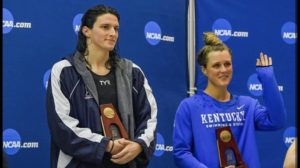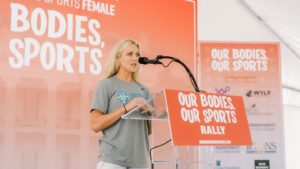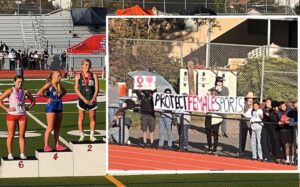University of Kentucky swimmer Riley Gaines was tossed into the transgender athlete debate. Come on in, she says, the water’s fine
Riley Gaines figures she had all of three weeks away from swimming during her entire four years in college, when she became an elite competitive swimmer. Even during the COVID pandemic, when pools…
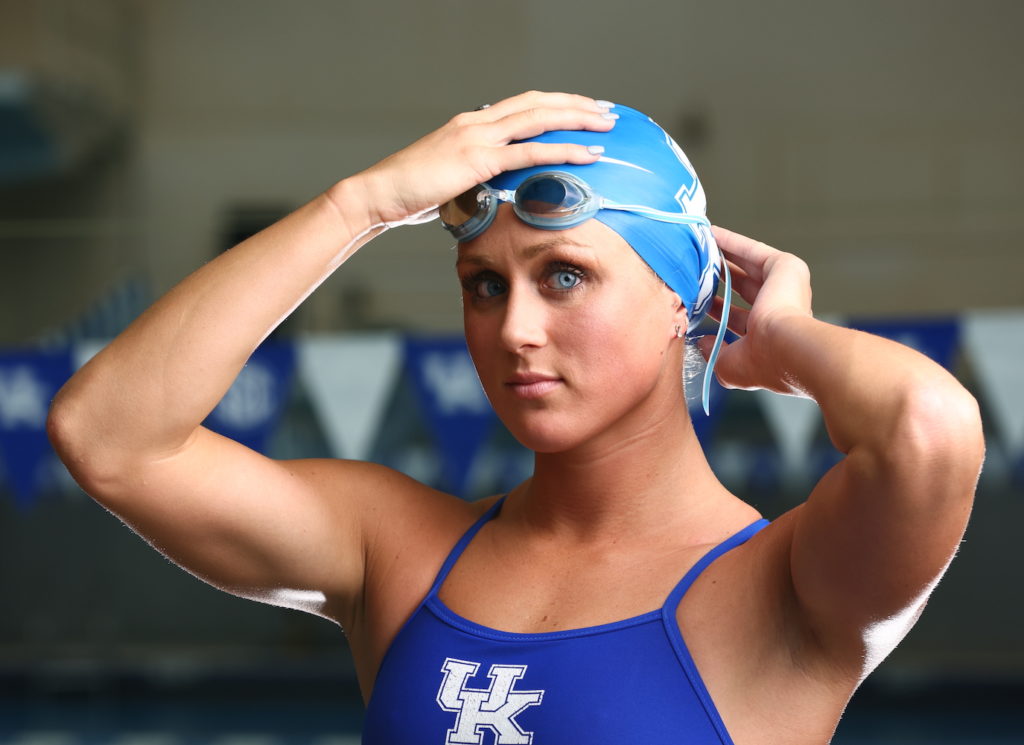
Riley Gaines figures she had all of three weeks away from swimming during her entire four years in college, when she became an elite competitive swimmer. Even during the COVID pandemic, when pools were closed, she donned a wetsuit and jumped in a cold lake for hours at a time.
“You’re there all summer,” she tells The Lion of the sacrifices made by top college athletes. “You’re there up until Christmas Eve. Then you get to go home for Christmas Day. But right after Christmas Day, you’re coming right back to school. You’re there for Thanksgiving. You’re there for all your spring break. You don’t get to travel. You don’t get to go on vacations. You don’t get to take time off.”
Yet, in March she tied for fifth place in the 200-yard freestyle at the NCAA women’s swimming championships with a swimmer who’d actually laid off swimming for a year.
That swimmer was transgender athlete Lia Thomas – who’d also just won first place in the women’s 500-yard freestyle, but who had taken roughly a year off while undergoing hormonal treatments to transition to female. While Gaines hardly got dry the whole time.
What is that, she wonders, if not a steep and inherent biological advantage?
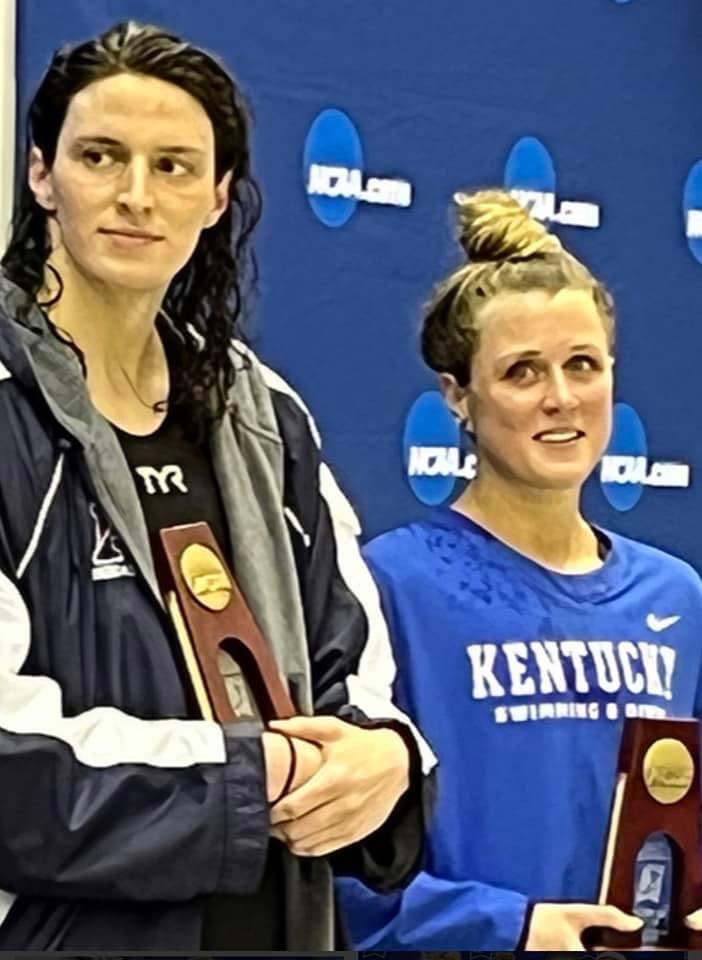
“To have someone, who took a full year off of swimming while transitioning, to come back and win a national title by seconds – when not even just the year before, was ranked 500th as a male, not even remotely being anywhere near close to qualifying for the men’s National championship meet? It just feels like, ‘How are people ignoring this? How are we ignoring these facts?’ It’s not an opinion, what I’m saying. These are all things that have happened and are on paper, because it’s what occurred.”
Whatever tests there are on a competitor’s testosterone levels – if any, or if adequate – Gaines says that’s not the sole advantage of a biological male.
“There are so many things that testosterone suppression doesn’t change on a man, including your lung size, your heart size – obviously your height and your wingspan and your bone density. Men have a 40% larger throat than females. And that plays a huge part in success.”
Some may ignore such baked-in injustices out of fear – much of it valid: Though Gaines’ University of Kentucky and Southeastern Conference have been highly supportive of her speaking out on the issue, she says Thomas’ Ivy League teammates at the University of Pennsylvania were told not to do so – and even to seek counseling for themselves if they’re uncomfortable with seeing male genitalia in the women’s locker room.
“They were referred to the LGBTQ Education Center to educate themselves on what these oppressed people are dealing with,” Gaines says. Moreover, they were issued thinly veiled threats if they speak out.
“They’re told they will never get a job; their school has made their stance for them; they’re told they will never get into grad school. They’re emotionally blackmailed into thinking that if they speak out and any harm comes toward the transgender athlete’s way – whether it be self-inflicted or from someone else – then they are solely responsible. And so, they’re taught to really think they’re crazy for not wanting to compete against men and change in a locker room with men.
“It has made this issue not just an issue of equal rights; this is totally an issue of freedom of speech. These girls are having their freedom of speech totally infringed upon by their universities and by people who are supposed to be looking out for them – and sticking up for them and making sure that they’re safe and they have privacy.
“But again, that’s not what we’re seeing.”
Thus, carrying this banner for women’s sports is left to an iron-willed 22-year-old from Tennessee who’s had to grow up in the ways of the world much faster than most of her peers. And while there’s been the usual bile tossed her way, she shakes it off – carried aloft by support that is “tenfold” greater than the hate, and by a family’s Christian faith that is completely unshaken.
She views the venom sympathetically as “deeply rooted in insecurity,” and her own story simply a matter of truth and happenstance – though Twitter saw it differently and suspended the account through which she communicated her story as well as others’.
“Never, ever once did I state an opinion that would result in me getting banned, or spread hate,” she says. “But of course, my account was banned. So, I have been silenced in some ways. But I have so much support from my family and from my university and my husband, and all those things, that allow me to feel comfortable and secure in speaking out.”
Throughout it all, her faith has been central to keeping afloat in her sudden, unsought role as international ambassador in the fight for girls’ and women’s sports.
“Man, it’s huge,” she says of her faith. “I think for the longest time when I was kind of debating speaking up, I was so nervous because my No. 1 thing in life that I want to do is live a Christ-like life. You struggle with the thoughts of, ‘Is what I’m saying hateful? Am I spreading hate?’ And so, I pray and pray and pray until finally it becomes clear to me that what I’m saying is not rooted in hate. What I’m saying is rooted in facts and truths, and my truth.”
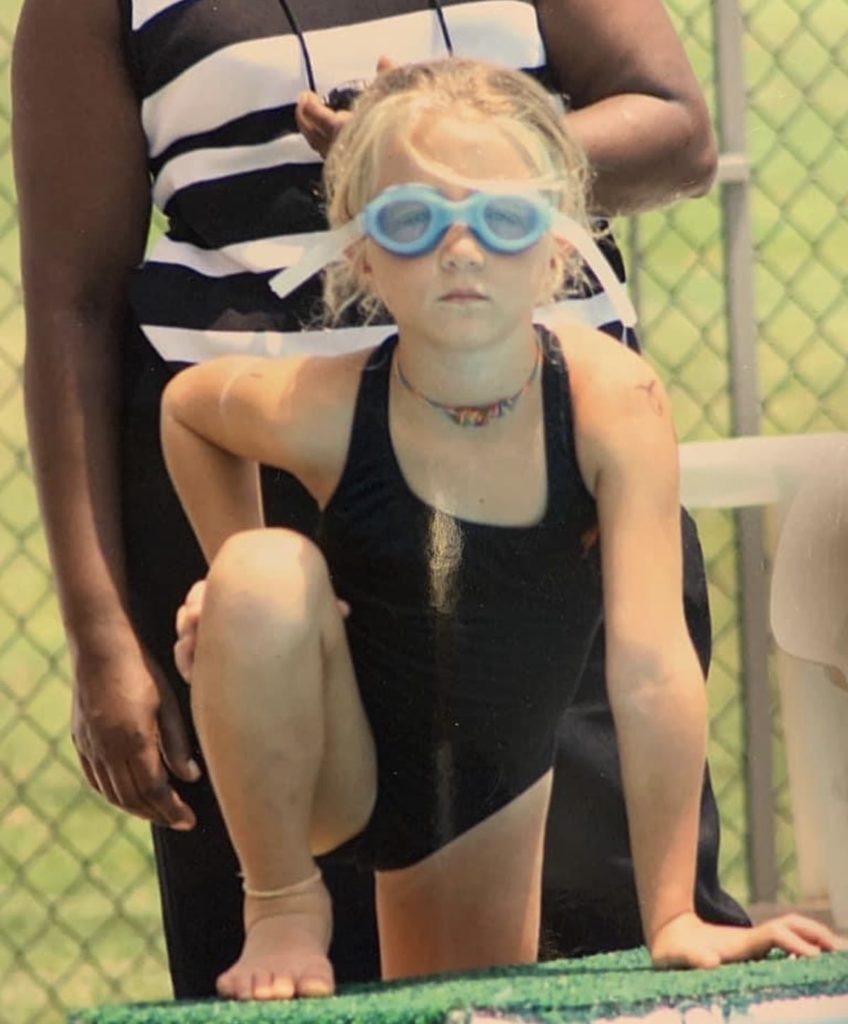
The support and camaraderie of other women and women’s organizations spanning the full ideological spectrum also have buoyed her – and surprised her. Just prior to her interview with The Lion, Gaines had gotten off the phone with new friend and mentor Tulsi Gabbard, the former congresswoman and presidential candidate who recently announced she’s walking away from the Democrat Party.
Gaines is partnering now with such organizations as the Independent Women’s Forum (IWF) and Independent Council on Women’s Sports (ICONS).
“There have been lots of liberal organizations and liberal affiliations that I have been connected with throughout this time. It’s fantastic. I think that’s what makes this issue so special, is that it does cross party lines. I don’t think it’s something that should even be partisan. This is a nonpartisan issue.
“Oh my gosh, if you’re thinking of this from a parent’s perspective, I don’t think it’s just Republican dads who don’t want their daughters being forced to look at male parts, and a person with male parts looking at their daughters change in a locker room.
“This is something that a majority of the country can agree on and unite with each other on.”
She also was called upon by the Kentucky General Assembly to support S.B. 83, which this year banned transgender athletes from competing in girls’ K-12 sports.
“You actually feel like you’re doing something,” she says of helping pass legislation. “You’re contributing to make a change, to where some young girl who may be in middle school doesn’t have to deal with looking at a boy in the locker room. So, I do enjoy the policy work on the legislature side of things. It’s rewarding, to say the least. It makes it feel worth it.”
Her relationship with the NCAA, sadly, has suffered after its decision not only to allow this to happen to her and other women athletes, but to actually fete it: After Gaines tied with Thomas, and since there was only one fifth-place trophy lying around, officials let Thomas pose with it on the platform; Gaines was only allowed to hold the sixth-place trophy.
Then Thomas was actually nominated for 2022 NCAA Woman of the Year.
Not long after Gaines hit the wall to finish the 200-yard freestyle, she’d seen the writing on it.
“They were encouraging it. They were celebrating it,” she says. “And I realized the NCAA, this isn’t something that was just sprung upon them. They’re pushing along this woke fad, this agenda that our society has really created. And that’s when I realized that the NCAA is not our friend in this fight, which is sad.
“It’s a hard realization to come to, because this is an organization that I dedicated my whole life to. But to know that they don’t have your back is incredibly just disheartening and upsetting.”
In contrast, and in what Gaines calls “a bold first step,” FINA – the international federation for water sports – has banned male-to-female transgender athletes from women’s competition unless they basically transitioned before puberty. But while well-intentioned enough, Gaines says that provision might only have the effect of pushing the transitioning of kids down to age 12 and below.
“It’s crazy – that we’re kind of acknowledging that 12-year-olds should make these unalterable changes to their body without knowing the implications. Because at 12 years old, you just don’t understand that fully.”
To fight such battles, Gaines today has a much bigger platform than the one she shared with a biological male. Earlier this year she actually was called upon to introduce Gabbard for an award at the IWF gala. Last month Gaines participated in the FiLiA Women’s Rights Conference in London. She’s traveling all over, giving interviews all over, galvanizing support for the integrity and protection of women’s sports all over. She’s writing a book.
And all that while getting married, building a house, herding dogs and settling down.
“I’m like, ‘Oh my gosh, how did I just turn into an old lady so fast?’” she says.
Answer: She was thrown into this particular pool.
But like the elite female athlete she is, she immediately started churning.

